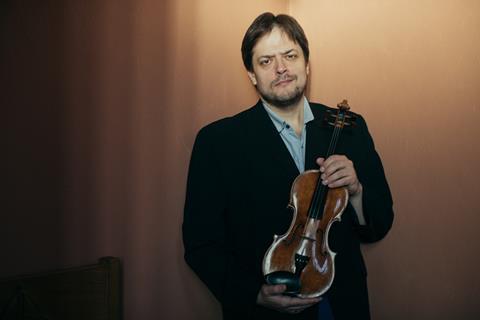The violinist and violist boils down a career’s worth of experience as soloist, chamber musician and teacher

Growing up in a family where almost everyone was a musician (my late father was violinist/violist and teacher Grigori Zhislin), I didn’t really have to think too much about what I was doing on the instrument. (Nearly) everything was taken care of, all I had to do was catch the huge amounts of information thrown at me.
That had its positive and negative elements.
On one hand, everything I did on the violin felt pretty easy, both technically and musically. But on the other, it meant that when I was left on my own and had to face ‘that world out there’, I had to start using my own imagination, gain my own experience and widen my repertoire and knowledge in order to achieve real levels of sensitivity and musicianship. Years of teaching and having to constantly find new ideas and an individual approach to every student have helped a lot to approach my own playing from different angles.
I would like to look at several basic elements that have served me as the main ‘pillars’ of playing, which are sometimes not given as much attention as they deserve
SOUND
Finding your own individual sound and making sure that it constantly develops and becomes unmistakably associated with you is not as easy as it seems. Training our ear is essential. The way I think we should work on sound profoundly is by starting with playing long notes, one by one. Everyone determines their own length and duration. The important thing is to make sure that the sound on every note is not affected in any way, that it stays exactly the same, from start to finish.
It’s harder than it looks.
The task is to make sure that we start the note with a nice, delicate yet firm sound, and keep it that way right until the very end. This, of course, gives us a chance to work on our bow control, but most importantly we train our ear to develop a fine control over the quality of the sound. Capturing a sweet, unique and individual sound, then learning to develop it opens up huge potential.
VIBRATO
I come from an old school musical background, where vibrato is considered an essential tool for all sorts of nuances. We often tend to work on our vibrato by ‘detaching’ it from the tone. I feel we always have to remember that sound and vibrato are two inseparable things.
ENERGY
I have been obsessed with this for quite some time now. I passionately believe that from the moment we put the bow on the string, we must keep the sound alive. The softer the colour, the more energy and electricity we have to put through each note. I feel that when I play I become an extension of the instrument, my whole body conducts the sound.
Every violinist must develop an individual voice, says Aaron Rosand
Personality is no longer encouraged in musical performance
Ask the Experts: should players separate technique and musicality in practice?
INTONATION
We all take intonation for granted, but don’t always, I find, work on it in the right way. What helps me, and my students, apart from playing slowly (obviously) is playing as softly as possible. It’s like reading a text: if it’s too close, we can only see separate letters, but won’t be able to make out the words and sentences. The same with quiet playing: it will give us a chance to see a bigger picture and adjust individual notes within as necessary.
RHYTHM
As basic as it seems, it is THE foundation of any music, like a heartbeat is to life. The metronome should become an item of our everyday life (however annoying it might be), so that we can constantly improve our sense of pulse in music.
CONCENTRATION
When we were children and teenagers, we found it hard to concentrate during our practising, because we were inexperienced. These days, I also find it hard to stay focused on what I am doing while practising for more than 5-10 minutes: ‘Have I sent that important email? I am running late to pick up my daughter from School… Is she going to eat fish for dinner?!’ Before I know it, the concentration is gone, my brain is somewhere else. Training myself to stay focused for longer periods of time is something I take very seriously.
Finally, one of the most important things I tell myself and my students: first find your sound and then build everything else around it. You can learn all the theory in the world, but you need to understand what you are learning this theory for: it is ultimately simply a tool which enables you to express your thoughts and emotions.
Yuri Zhislin is a soloist and chamber musician and professor of violin and viola at the Royal College of Music in London
His latest album with Natalia Lomeiko and Ivan Martin of trios by Brahms, Bruch and Schubert is available for pre-order now from https://orchid-music.lnk.to/lomeikozhislinmartin











































No comments yet